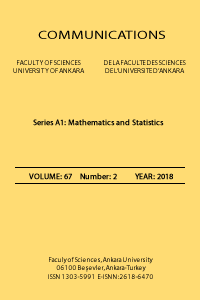An efficient variant of dual to product and ratio estimators in sample surveys
This manuscript considers a dual to product and ratio estimator for estimating the finite population mean of study variable on applying a simple transformation to the auxiliary variable by using its average values in the population that is generally available in practice. The mean square error (MSE) of the proposed estimator has been obtained to the first degree of approximation. The optimum values and range of suitably chosen scalar, under which the proposed estimator perform better, have been determined. A method to lower the MSE of the proposed estimator relative to that of the MSE of the linear regression estimator is developed for small sample sizes. Theoretical and empirical studies have been done to demonstrate the superiority of the proposed estimator over the other estimators.
Keywords:
Study variable, auxilliary variable population mean, Bias, MSE,
___
- Adebola, F. B., Adegoke, N. A., Sanusi, R. A., A class of regression estimator with cum-dual ratio estimator as intercept, International Journal of Probability and Statistics, 4(2) (2015), 42-50. https://doi.org/10.5923/j.ijps.20150402.02
- Bandyopadhyaya, S., Improved ratio and product estimators, Sankhya: The Indian Journal of Statistics, series C, 42 (1980), 45-49.
- Choudhury, S., Singh, B. K., An efficient class of dual to product-cum-dual to ratio estimators of finite population mean in sample surveys, Global Journal of Science Frontier Research, 12(3) (2012), 25-33.
- Cochran, W. G., The estimation of the yields of cereal experiments by sampling for the ratio of grain to total produce, The Journal of Agricultural Science, 30(2) (1940), 262-275. https://doi.org/10.1017/S0021859600048012
- Cochran, W. G., Sampling Techniques, 3rd edition, John Wiley and Sons, New York, 1977.
- Das, A. K., Contribution to the theory of sampling strategies based on auxiliary information, Ph.D. thesis submitted to BCKV, Mohanpur, Nadia, West-Bengal, India, 1988.
- Enang, E. I., Uket, J. O., Ekpenyong, E. J., A modified class of exponential-type estimator of population mean in simple random sampling, International Journal of Advanced Statistics and Probability, 5(2) (2017), 70-76. https://doi.org/10.14419/ijasp.v5i2.7345
- Johnston, J., Econometric Methods, 2nd edition, Mc Graw Hill Book Company, Tokyo, 1972.
- Kadilar, C., Cingi, H., A new estimator using two auxiliary variables, Applied Mathematics and Computation, 162 (2005), 901-908. https://doi.org/10.1016/j.amc.2003.12.130
- Maddala, G. S., Econometrics, Mc Graw Hill, New York, 1977.
- Murthy, M. N., Product method of estimation, Sankhya: The Indian Journal of Statistics, Series A, 26 (1964), 69-74.
- Robson, D. S., Application of multivariate polykays to the theory of unbiased ratio type estimation, Journal of the American Statistical Association, 52 (1957), 511-522. https://doi.org/10.1080/01621459.1957.10501407
- Singh, H. P., Pal, S. K., Mehta, V., A generalized class of dual to product-cum-dual to ratio type estimators of finite population mean in sample surveys, Applied Mathematics & Information Sciences Letters, 4(1) (2016), 25-33.
- Singh, M. P., Comparison of some ratio-cum-product estimators, Sankhya: The Indian Journal of Statistics, Series B, 31 (1969), 375-378.
- Srivenkataramana, T., A dual to ratio estimator in sample surveys, Biometrika, 67(1) (1980), 199-204. https://doi.org/10.1093/biomet/67.1.199
- Sukhatme, B. V., Chand, L., Multivariate ratio-type estimators, Proceedings of the Social Statistics Section of the American Statistical Association, (1977), 927-931.
- ISSN: 1303-5991
- Yayın Aralığı: Yılda 4 Sayı
- Başlangıç: 1948
- Yayıncı: Ankara Üniversitesi
